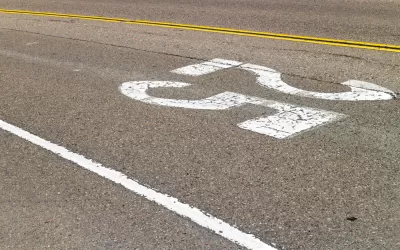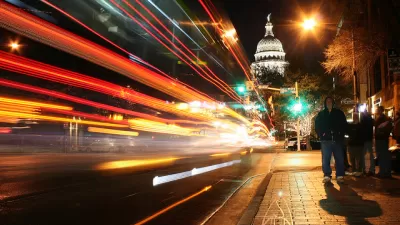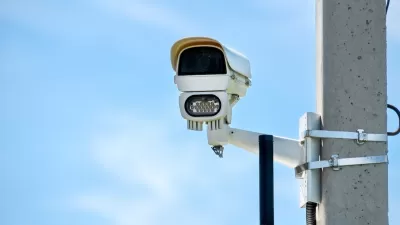A decision by the city of Austin to support lower speed limits on some city streets will remain a symbolic gesture until the state allows local governments to establish their own speed limits.

"The Austin City Council asked staffers Thursday to review city speed limits, with the goal of reducing the speed limits on some streets to make them safer," reports Katie Hall.
But there's a catch. The action by the City Council comes with the caveat that the city still needs support from the idea from the state. So, reports Hall, "the council [also] said the city would support efforts in the Texas Legislature to lower the default speed limit on Texas roads from 30 to 25 mph."
Such legislation has been a tough sell in the Texas Legislature, and a "state bill proposing the same change was not successful during the last legislative session."
Texas isn't the only state around the country holding up the Vision Zero and speed limit reduction actions of local governments. Angie Schmitt followed on the news from Austin by noting that Texas is far from the only state in the country that has the same power over local governments. Other states, however, like Massachusetts, New York, and Washington all made decisions recently to give local governments the power to lower their speed limits. City officials in Portland are still waiting for the same power from the state of Oregon.
Jay Blazek provides additional commentary on the Austin City Council's decision, arguing for the benefits of lower speed limits to cars and drivers, not just pedestrians and bikers. Blazek's arguments respond to some of the dissenting opinions regarding Austin's recent decision.
FULL STORY: Austin City Council moves to reduce speed limits on some roads

Trump Administration Could Effectively End Housing Voucher Program
Federal officials are eyeing major cuts to the Section 8 program that helps millions of low-income households pay rent.

Planetizen Federal Action Tracker
A weekly monitor of how Trump’s orders and actions are impacting planners and planning in America.

Ken Jennings Launches Transit Web Series
The Jeopardy champ wants you to ride public transit.

Opinion: Transit Agencies Must View Service Cuts as Last Resort
Reducing service could cripple transit systems by pushing more riders to consider car ownership, making future recovery even less certain.

‘Smart Surfaces’ Policy Guide Offers Advice for Building and Maintaining Urban Tree Canopies
Healthy, robust tree canopies can reduce the impacts of extreme heat and improve air quality.

New Jersey Lawsuit Targets Rent-Setting Algorithms
The state of New Jersey is taking legal action against landlords and companies that engage in what the state’s Attorney General alleges is illegal rent fixing.
Urban Design for Planners 1: Software Tools
This six-course series explores essential urban design concepts using open source software and equips planners with the tools they need to participate fully in the urban design process.
Planning for Universal Design
Learn the tools for implementing Universal Design in planning regulations.
Heyer Gruel & Associates PA
Ada County Highway District
Institute for Housing and Urban Development Studies (IHS)
City of Grandview
Harvard GSD Executive Education
Toledo-Lucas County Plan Commissions
Salt Lake City
NYU Wagner Graduate School of Public Service





























